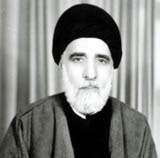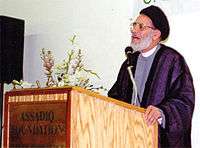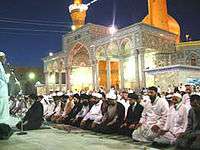Mortada Al-Qazwini

Ayatollah Sayed Mortada Al-Qazwini (born 1931) is a Muslim religious authority who resides in Karbala, Iraq. His struggle to defend his faith led him from his hometown of Karbala to exile in Kuwait, Iran, the United States, and finally back to Karbala where as of 2013 he led daily prayers at the shrine of Imam Hussein, the grandson of Islamic prophet Mohammad. He leads the prayer of salat Maghrib and Ishaa in the holy shrine of imam Hussein.
Youth and education

Sayed Mortada Al-Qazwini was born in Karbala, Iraq in 1931. His father, the grand Ayatollah Sayid Sadiq Al-Qazwini (shown to the right), was a Mujtahid; many people congregated to follow him in the daily prayers he led at the shrine of Al-Abbas and later in Al-Attareen Mosque. Ayatollah Sayed Mohammed Sadiq was captured by Saddam's regime on April, 18, 1980 at the age of 80 and detained there indefinitely as the oldest political prisoner in the world according to the Amnesty International.
Sayed Mortada Al-Qazwini was raised in a strong religious environment under the guidance of his parents who taught him to recite and understand the Qur'an from his infancy. He began studying at the Hawza (seminary) in Karbala at the age of 12. He carried out theological studies and academic education concurrently, and at the age of 17 was awarded by the Iraqi president of the time for being the top student in the 12th grade in the country.
In his early teens, Sayed Mortada Al-Qazwini began to learn the essence of speech under the guidance of his uncle, Ayatollah Sayed Saleh Al-Qazwini. By the age of 18, Al-Qazwini had reached a level of Islamic Fiqh (jurisprudence) that qualified him to teach in the seminary of Karbala. He often gave sermons in the shrine of Imam Al-Hussein, attended by thousands of people.

In his early 20s, Sayed Mortada Al-Qazwini began traveling all over the Arabic-speaking world to lecture. Countries he visited included Kuwait, Bahrain, Saudi Arabia,Syria, Egypt, Oman and other countries in the region.
Sayed Mortada Al-Qazwini also studied jurisprudence (Fiqh and Osool) under scholars including Grand Ayatollah Sayid Mirza Mahdi Al-Shirazi, Grand Ayatollah Imam Sayed Hadi Al-Milani, and Ayatollah Sheikh Ja'far Rashty. In his early thirties, he was certified by all of his teachers for having reached the highest level in Islamic education (jurisprudence) meaning Ijtihad; Al-Qazwini became a Mujtahid in the 1950s.
Al-Qazwini had to leave his hometown of Karbala in 1970 because of the severe persecution against the Shia in Iraq. He fled to Kuwait in October 1971 and picked up where he left off in Iraq from delivering speeches to teaching jurisprudence classes.
Establishments

Mortada Al-Qazwini founded the first modern, full-time Islamic school in Karbala, named “Imam Al-Sadiq School”, and presided as the principal for several years. In the 1960s, he established and directed Al-Kitab Wal-Etra Institution for advanced religious studies in Karbala. The institution developed and trained speakers and scholars and dispatched them to all parts of Iraq. After migrating to Kuwait, Imam Al-Qazwini also founded Al-Rasoolel A'dham College in Kuwait. After the Islamic revolution in Iran, he served as a professor in Shaheed Motahari University in Tehran. Furthermore, he taught in the Hawza (seminary) in Qum for several years. Al-Qazwini was also a supreme judge in the Islamic Republic's judiciary system for many years, appointed by Imam Khomaini. In Jamkaran, Iran, Imam Al-Qazwini led the jum'a prayers for a period of time. In the capital, Tehran, Al-Qazwini also led prayers at a masjid named “Masjid Al-Qodos.”
In 1986, Mortada Al-Qazwini moved to the United States, where he established many more Islamic centers and institutions and served as a spiritual leader to the Muslim community. In the US he founded “Masjid Al-Zahra” in Los Angeles, where he led prayers and offered lectures and religious programs. He also founded “Imam Ali Islamic Center” in San Diego, which was directed by his son, Al-Alamah Sayid Mohammad Al-Qazwini, before his return to Iraq, as well as another Islamic center and masjid, the “Islamic Educational Center of Orange County”, which is directed by his other son, Al-Alamah Sayid Mostafa Al-Qazwini. Ayatollah Al-Qazwini also established Assadiq Foundation, also in Los Angeles, directed by his oldest son Sayid Ali Al-Qazwini, which conducts various Islamic services. Imam Al-Qazwini founded and served as the religious leader for a full-time Islamic school, the “City of Knowledge,” which provides hundreds of students with an academic and Islamic education. He also provided the Muslim community of Los Angeles, both men and women, with a Hawza for basic Islamic studies and guided the establishment of the Muslim Youth Association of Southern California.
Publications
Mortada Al-Qazwini has written a variety of books for Muslim youth.
Return to Karbala

Upon the toppling of Saddam's regime in 2003, Ayatollah Sayid Mortada Al-Qazwini immediately returned to his hometown of Karbala, Iraq. At the request of the citizens of Karbala, Ayatollah Al-Qazwini became the Imam of the daily prayers at the shrine of Imam Hussein in Karbala. Along with leading the prayers, he conducts daily sermons and is involved in education. In 2007 he was injured in an attempt to assassinate him as he was on his way home after delivering his nightly lecture at the shrine of Imam Hussein. He continued to lead prayers and deliver nightly lectures.
Development and Relief Foundation

As Ayatollah Al-Qazwini returned to Iraq, it was every evident that Saddam Hussein had destroyed his own country in all forms and aspects. Saddam had destroyed people through numerous ways, and the city of Karbala was on top of the list. At the greatest level, Saddam had killed millions of men, leaving millions of orphans. According to UNICEF, there were 5 million orphans in Iraq in 2007. Saddam had completely abandoned all forms of humanitarian services for the people of Karbala: • Only one, poorly maintained, hospital in Karbala. • Very few schools that did not meet the basic school standards. • Religious schools and seminaries completely banned Ayatollah Al-Qazwini embarked on a mission to try and revive Karbala. In 2004 the Development and Relief Foundation (DRF) was founded and established by Ayatollah Al-Qazwini. The DRF has completed a school, orphanage, Islamic Seminary and a cardiac center. In 2008 he sponsored and lead the efforts of constructing the Imam Al-Hujjah Hospital (project), a first charity hospital project in the region that is solely founded on donations of philanthropists at large. This ambitious enterprise has gained interest and recognition of several healthcare institutes in North America, among which are the Institute of International Health at Michigan State University and Hardin Memorial Hospital in Louisville, Kentucky<www.karbalahospital.org>
External links
- www.karbalahospital.org/ The Imam Al-Hujjah Hospital-Karbala